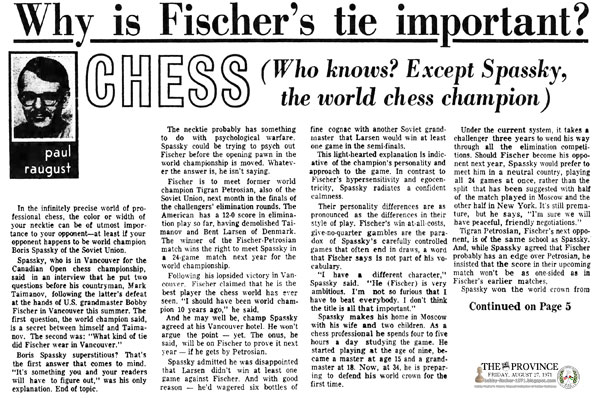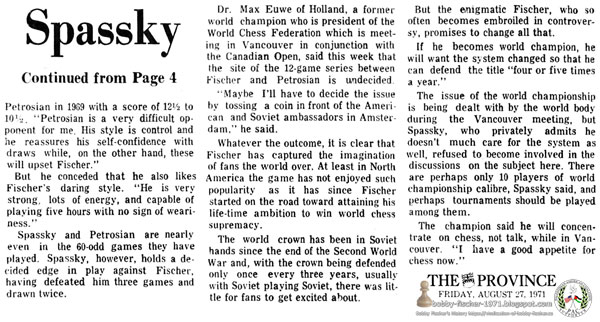The Province Vancouver, British Columbia, Canada Friday, August 27, 1971 - Page 46
Why is Fischer's Tie Important? (Who knows? Except Spassky, the world chess champion) by Paul Raugust
In the infinitely precise world of professional chess, the color or width of your necktie can be of utmost importance to your opponent—at least if your opponent happens to be world champion Boris Spassky of the Soviet Union.
Spassky, who is in Vancouver for the Canadian Open chess championship, said in an interview that he put two questions before his countryman, Mark Taimanov, following the latter's defeat at the hands of U.S. grandmaster Bobby Fischer in Vancouver this summer. The first question, the world champion said, is a secret between himself and Taimanov. The second was: “What kind of tie did Fischer wear in Vancouver?”
Boris Spassky superstitious? That's the first answer that comes to mind. “It's something you and your readers will have to figure out,” was his only explanation. End of topic.
The necktie probably has something to do with psychological warfare. Spassky could be trying to psyche out Fischer before the opening pawn in the world championship is moved. Whatever the answer is, he isn't saying.
Fischer is to meet former world champion Tigran Petrosian, also of the Soviet Union, next month in the finals of the challengers' elimination rounds. The American has a 12-0 score in elimination play so far, having demolished Taimanov and Bent Larsen of Denmark. The winner of the Fischer-Petrosian match wins the right to meet Spassky in a 24-game match next year for the world championship.
Following his lopsided victory in Vancouver, Fischer claimed that he is the best player the chess world has ever seen. “I should have been world champion 10 years ago,” he said.
And he may well be, champ Spassky agreed at his Vancouver hotel. He won't argue the point — yet. The onus, he said, will be on Fischer to prove it next year — if he gets by Petrosian.
Spassky admitted he was disappointed that Larsen didn't win at least one game against Fischer. And with good reason — he'd wagered six bottles of fine cognac with another Soviet grandmaster than Larsen would win at least one game in the semi-finals.
This light-hearted explanation is indicative of the champion's personality and approach to the game. In contrast to Fischer's hypersensitivity and egocentricity, Spassky radiates a confident calmness.
Their personality differences are as pronounced as the differences in their style of play. Fischer's win at all costs, give no quarter gambles are the paradox of Spassky's carefully controlled games that often end in draws, a word that Fischer says is not part of his vocabulary.
“I have a different character,” Spassky said. “He (Fischer) is very ambitious. I'm not so furious that I have to beat everybody. I don't think the title is all that important.”
Spassky makes his home in Moscow with his wife and two children. As a chess professional he spends four to five hours a day studying the game. He started playing at the age of nine, became a master at age 15 and a grandmaster at 18. Now, at 34, he is preparing to defend his world crown for the first time.
Under the current system, it takes a challenger three years to wend his way through all the elimination competitions. Should Fischer become his opponent next year, Spassky would prefer to meet him in a neutral country, playing all 24 games at once, rather than the split that has been suggested with half of the match played in Moscow and the other half in New York. It's still premature, but he says, “I'm sure we will have peaceful, friendly negotiations.”
Tigran Petrosian, Fischer's next opponent, is of the same school as Spassky. And, while Spassky agreed that Fischer probably has an edge over Petrosian, he insisted that the score in their upcoming match won't be as one-sided as in Fischer's earlier matches.
Spassky won the world crown from
Continued on Page 5
Spassky Continued from Page 4
Petrosian in 1969 with a score of 12½ to 10½. “Petrosian is a very difficult opponent for me. His style is control and he reassures his self-confidence with draws while, on the other hand, there will upset Fischer.”
But he conceded that he also likes Fischer's daring style. “He is very strong, lots of energy, and capable of playing five hours with no sign of weariness.”
Spassky and Petrosian are nearly even in the 60-odd games they have played. Spassky, however, holds a decided edge in play against Fischer, having defeated him three games and drawn twice.
Dr. Max Euwe of Holland, a former world champion who is president of the World Chess Federation which is meeting in Vancouver in conjunction with the Canadian Open, said this week that the site of the 12-game series between Fischer and Petrosian is undecided.
“Maybe I'll have to decide the issue by tossing a coin in front of the American and Soviet ambassadors in Amsterdam,” he said.
Whatever the outcome, it is clear that Fischer has captured the imagination of fans the world over. At least in North America the game has not enjoyed such popularity as it has since Fischer started on the road toward attaining his life-time ambition to win world chess supremacy.
The world crown has been in Soviet hands since the end of the Second World War and, with the crown being defended only once every three years, usually with Soviet playing Soviet, there was little for fans to get excited about.
But the enigmatic Fischer, who so often becomes embroiled in controversy, promises to change all that.
If he becomes world champion, he will want the system changed so that he can defend the title “four or five times a year.”
The issue of the world championship is being dealt with by the world body during the Vancouver meeting, but Spassky, who privately admits he doesn't much care for the system as well, refused to become involved in the discussions on the subject here. There are perhaps only 10 players of world championship caliber, Spassky said and perhaps tournaments should be played among them.
The champion said he will concentrate on chess, not talk, while in Vancouver. “I have a good appetite for chess now.”
























